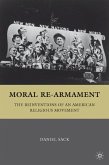This book places in historical context the continuing push-pull dynamics between national politics and the entrenched tradition of local control over law enforcement in the U.S. Drawing on the present sense of urgency around the War on Terror and earlier national political initiatives that have sought to influence law enforcement at the local level, this multidisciplinary collection addresses key questions about how national and geopolitical developments come to shape local policing, and inform who decides how, and to what end, local police forces will maintain public order, interact with local communities, and address issues of accountability, oversight, and reform.
"An exciting collection...of insightful and innovative explorations into the broader history of policing in the U.S." - Petula Iu, Ph.D., Independent Scholar"Time out of mind, one of the hallmarks of American policing has been its localism; there are thousands of police departments, many of them very small. As thisfascinating book shows, after 9/11 police localism is fading. As the rhetoric of the war on crime is being pushed aside by the war on terror, federal policy is constantly intruding at the local level, often in ways that local police did not foresee and do notalways like. These essays also remind us that the intrusion is in fact not so new; it has been going on for decades in myriad ways we have forgotten or never noticed, and similar processes are at work in other countries." - Paul Chevigny, Professor of Law, New York University Law School"This timely collection is united by the theme of the complex interaction between traditionally local police forces and the initiatives, needs and requirements of national authorities. The essays carry us from the 'war on crime' to the 'war on terror.' It is an essential read for scholars interested in a fundamental, sometimes conflicted, evolution of police practices, goals, and responsibilities since the early twentieth century." - Wilbur Miller, Professor of History, State University of New York, Stony Brook








